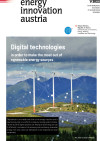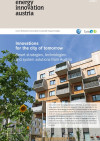Suchergebnisse für "Factsheet: Energietechnologien gestalten, die für alle sinnvoll und nutzbar sind"
BIMaterial Process Design for Material Building Pass
Building Information Modelling supported compilation of a Material Building Pass; as a qualitative and quantitative documentation of the material composition of, and the material distribution within, a building structure. This project is a central milestone towards standardized, BIM-generated building material passes.
Digital technologies

Digital technologies in order to make the most out of renewable energy sources.
energy innovation austria
1/2022
Herausgeber: BMK in cooperation with the Climate and Energy Fund
Englisch, 12 Seiten
Downloads zur Publikation
SmartCity Baumgarten - Demonstration of an anergy network and implementation of climate-friendly solutions in existing districts
Implementation of a cross-property anergy network for the supply of heating, cooling and electricity in an existing neighbourhood. With this demonstration project, a technical-legal alternative for areas outside of district heating supply is developed, which makes it possible for neighbourhoods to join together to use renewable energies in common.
GREeNvaluation - Real-time monitoring and performance evaluation
The aim of the project was the development of the GREeNvaluation toolkit, as a precursor to the implementation of green and liveable cities. The visualization and accounting (cost / benefit) of green infrastructure services makes the benefits more tangible and understandable. The GREeNvaluation toolkit aims to create awareness far beyond the target areas by means of target group-specific communication formats.
GREENsChOOLENERGY - Development and practical implementation of sustainable solutions for urban hotspots in combination with greening / PV / water
Use of the synergetic effects in the construction of photovoltaic, greening and irrigation systems at the location of HTL1 Klagenfurt Lastenstraße, to optimize the yield of experimental photovoltaic elements and at the same time reduce urban heat islands.
ESSBAR – Edible balcony gardens for retrofit – Vertical Greening Technologies for the City
Demonstration of an affordable, resource-saving and innovative balcony system with integrated edible vertical gardens and rainwater management. Considering the needs of residents for green outdoor spaces and the active participation of residents are an important part of the project.
Vilipa - Visible light based Person and Group Detection in existing buildings
Evaluation of the technical and economic feasibility of an occupancy detection system based on the technology of visible light sensing, which, in combination with the building management system, should reduce the energy consumption of buildings. The goal is to implement low-tech/low-complexity solutions that can distinguish between individuals and groups based solely on the detection of visible light reflections.
Reallabor Weizplus - Reallabor climate-neutral region Weizplus
Clarification of relevant questions for the potential establishment of a real lab in the region of Weizplus, which aims at a 100% supply of the region with renewable energies by 2030. The content-related technological focus of the activities of the future real lab is on all energy-relevant sectors (heating, electricity, cooling) applied to the focal points of energy efficiency and replacement of fossil energy in buildings, in trade and industry as well as mobility.
EM Städte - Monitoring and evaluation of urban energy flows
In the first phase of the project, the data source of the energy statistics will be analyzed. Based on the findings of the analysis a methodology on build up regional energy balances will be developed. The methodology will be integrated into the Senflusk tool and tested on five reference cities in Austria.
CO2 neuBau - The CO2-neutral Construction Site: a Contribution to the Climate Protection by the Austrian Construction Industry
Identification of all direct and indirect CO2, respectively, GHG emissions generated at construction sites. Analysis of the framework conditions and technologies towards demonstrating the options for their control. In parallel, added values, such as cost-benefit advantages of a CO2-neutral construction site, were outlined and quantified.
Innovations for the city of tomorrow

Smart strategies, technologies and system solutions from Austria
energy innovation austria
4/2016
Herausgeber: BMVIT und Klima- und Energiefonds
Englisch, 16 Seiten
Downloads zur Publikation
M-DAB2: Material intensity of inner development - resource assessment and localization of urban development potentials
For the first time, the material intensity of inner development (in terms of material quantities) for different design variants is to be considered in the evaluation of inner development potentials. A set of methods for the holistic evaluation of potential areas and different development variants and scenarios for resource-saving inner development will be created.
REC-Businesspark - Investigation of the first Austrian renewable energy community business and industrial park
In the course of the project, the conceptual design of a zero-emission or plus-energy business park in Weiz with a focus on photovoltaics and fuel cells in combination with a Renewable Energy Community (E-EGe) had been carried out. By establishing the park on a "greenfield", all structures can be created according to the requirements of the E-EGe.
Syn[En]ergy: Development of Potential Synergy Effects between the Interdependency of Urban Planning goals and Photovoltaic Usage on Open Urban Landscapes
Open spaces such as parking lots, brownfields and some categories of recreation areas offer an underutilised potential for photovoltaics in urban regions. In the course of Syn[En]ergy an inter- and transdisciplinary approach potential synergies and conflicts with other use demands were investigated, a typology and practical solutions for selected areas with regard to requirements from economy, urban planning and design, legal as well social aspects developed, and then evaluated by stakeholders from enterprises, administration and the general public.
SURO - The urban underground as mine? Potential of secondary resources in subsurface infrastructure systems
Feasibility of a resource cadaster to inventorize, characterize and locate material stocks in subsurface infrastructure networks. The results are used for the economic assessment of secondary resource potentials.
TWIN - Digital twins for sustainable buildings
Digital building twins have hardly been used in practice due to an often unfavourable cost-benefit ratio. The aim of the TWIN project is to bring together use cases of digital building twins with a high ecological and economic impact in order to prepare application scenarios with great implementation potential.
SmartQ+ Bruck/Leitha - Energy saving potentials through neighbourhood and community planning
First-time linking of transport and energy simulation models for municipal planning in order to visualise (energy) saving potentials in settlement development and effects of planning projects on mobility demand and the energy network of a municipality in an interactive visualisation.
Beyond - Virtual Reality enabled energy services for smart energy systems
Collaborative R&D project to develop the next generation energy services with the interplay of various technologies: Virtual Reality (VR), machine learning, physical simulation and Internet of Things (IoT) platforms.
CO2-Demobau - Exploration of the feasibility of carbon-neutral model construction sites
By highlighting green innovations, networking with stakeholders in the construction industry and applying the findings of the previous study "CO2 neutrale Baustelle", the foundation is set for future carbon-neutral model construction sites. These construction sites will serve as best-practice examples in the fields of contracting, construction operations organization and technology.
baubehoerde.at - Development of a Vision 2030 for a Digital Building Authority and Recommendations for Action in Austria
In Austria, planning permission applications are submitted and managed largely manually. The aims of the baubehoerde.at project are to evaluate the potential and limitations of digitizing building approval processes and to create a Vision 2030 strategy for a digital building authority.
